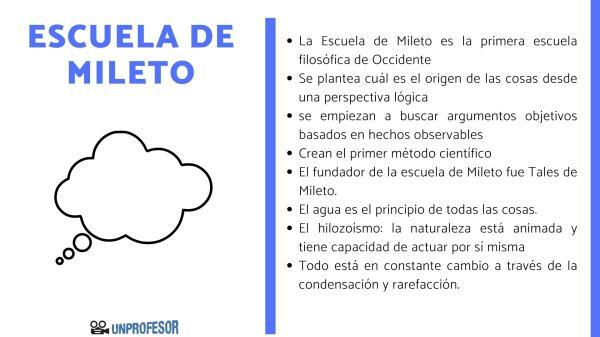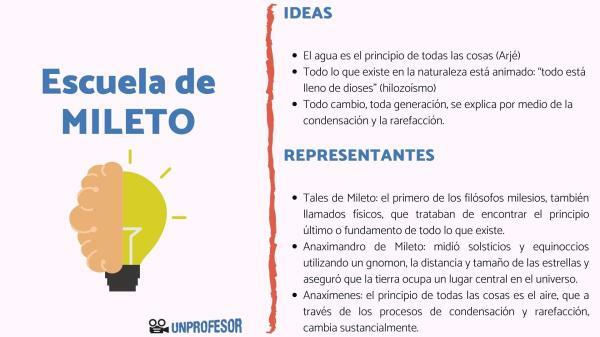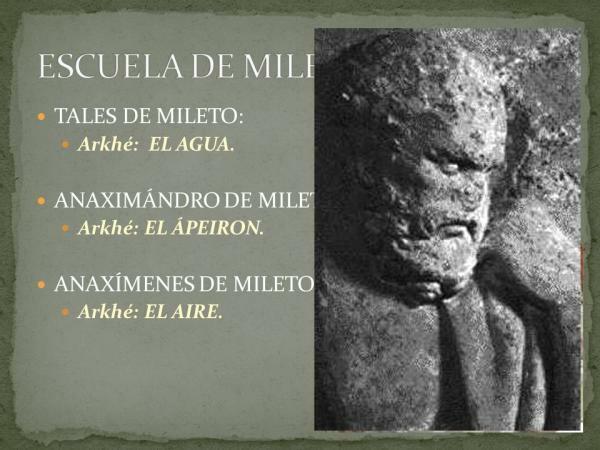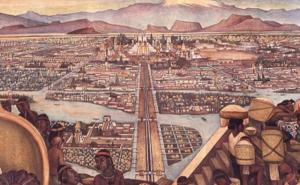What is the MILETO school

Welcome to a PROFESSOR. In today's class we are going to talk about what is the school of miletus, the first philosophical school of the West whose origin is found in the S.VII a. c. in the commercial city of Miletus (Ionia, Türkiye). Its founder was Thales of Miletus, considered the first philosopher because he was the first to question traditional thought based on myth and because he developed the idea of the origin of the universe (arkhe) from a conception that distances itself from supernatural intervention.
Likewise, to this philosophical school also belonged Anaximander and Anaximines, who continued to develop the concept of arkhe, but introducing some changes to the concept devised by his teacher. If you want to know more about the Miletus school, keep reading this article, start our journey to the origin of philosophy!
Index
- What is the School of Miletus?
- Who founded the School of Miletus?
- The philosophers of the school of Miletus
- What is the main idea of the School of Miletus?
- What was studied at the School of Miletus?
What is the School of Miletus?
The school of miletus It is the first philosophical school of the West and is considered as such because for the first time a philosophical thought is established that asks what is the origin of things from a logical perspective and because a thought with common characteristics is fixed among its members without being totally equal.
Likewise, we must bear in mind that the fact that philosophy was born in Miletus is not random, since we are in a place between the S. VII-VI a. c. it enjoyed a privileged situation at an economic, political, geographical and cultural level. All this favored a constant flow and exchange with other cultures (Persia, Egypt...) that gave rise to a rational thought about the world.
Thus, with this school, they begin to look for objective arguments based on observable facts from the data of the senses and experience. That is to say, he goes on to question mythological thought and defend that the human being needs to give an explanation based on reason. Birth of the first scientific method that he formulated hypotheses in order to draw logical conclusions from them.

Who founded the School of Miletus?
The founder of the Miletus school was Thales of Miletus. We know little about the life of Thales, except that he was born, lived and died in the commercial city of Miletus (Asia Minor-Turkey), which was descendant of Phoenicians and that throughout his life he was in contact with other cultures, sharing and acquiring new know. Which allowed him to create a broader composition of the concept of the world and, in turn, he was able to organize / structure everything learned to spread it in his school.
Similarly, Thales of Miletus is considered the first philosopher of the West for his great contributions, among which are the following:
- He was the founder of the Philosophy as a scientific and rational knowledge: He questions traditional thinking and talks about a new method to find a rational explanation.
- He made great contributions to physics: He affirmed that natural phenomena had a logical/rational explanation and assured that the origin of the universe was in a liquid matter (Arkhé).
- He carried out great astronomical discoveries and contributions to navigation: He calculated the size of the moon and pointed out that the sailors should orient themselves through the Big Dipper.
- He developed the theory about the physical world: He Defends the existence of an original principle and creator of everything.
- He was the founder of the mathematics and geometry: He Thales of Miletus theorem and the principle of similarity.

The philosophers of the school of Miletus.
In addition to the aforementioned Tales of Miletus, within the School of Miletus two other philosophers also stood out:
1. Anaximander of Miletus (610-545 BC). C.)
Anaximander He was born and lived in Miletus (Turkey), however, we know little about his life except that he was the son of Praxiades, who was a disciple of Thales of Miletus and who wrote a book called about nature(the first analytical and investigative work of the classical world). Among the main contributions of Anaximander, it is worth mentioning:
- The Ápeiron principle: The beginning of all things (arkhé= substance that is the origin of the universe) and from which all things arise. Everything comes out and comes back (all beings arise and derive from it) through a succession and cyclical struggle of opposites (day-night, hot-cold, wet-dry...). At a given moment, one of the opponents triumphs over the other creating an unfair situation, intervening cosmic justice to solve this injustice (first approximation to the idea of God Christian). Cosmic justice will make the previously defeated opponent triumph, thus beginning the cyclical process of change that characterizes our reality.
- In astronomy/cosmology Anaximandro he defended that the Earth was round, that it rotated on its own axis, that it was surrounded by heaven (above and below) and that it was the center of the universe.
- In geography he was one of the first to map the earth's surface (formed by Europe, Asia and Libya) of the world/ecumene with rivers (Nile, Phasis...) and seas (Mediterranean Sea and Black Sea). In this sense, he also pointed out that there was a progressive drop in sea level.
- He defends the idea that the origin of species is found in water and they are evolving little by little. Therefore, he was one of the first to question creation from a supernatural entity.
2. Anaximenes (585-524 B.C. C.)
Like his successors in the School of Miletus, Anaximenes Above all, he stood out for his contributions in the field of science. Among the highlights
- Air is the beginning and the end of everything in the universe, through two processes: rarefaction and condensation, which would be the cause of hot and cold, respectively. Thanks to the first, fire is formed, and through the second, the wind, clouds, water, earth, and finally the world originate.
- In astronomy/cosmology Anaximedes argued that the earth is flat, that the stars revolve around it and that the polar star was the center around which the sky revolved.
- In the field of geography, he pointed out that earthquakes were the result of drought and the lack of humidity, which caused the earth to break and the earthquake to occur.

What is the main idea of the School of Miletus?
The main idea of the School of Miletus is know and investigate the origin of the universe through the observation of the world that surrounds man and natural phenomena. In this way, Thales established the concept of arkhe or substance which is the origin of the universe and which is made up of water.
The fact that Tales He thought that the origin of the universe was water It was due to several to two reasons:
- The first reason was because the most widely used means of communication was water and islands emerged from the water.
- The second reason is that Thales of Miletus lived in Egypt where the floods of the Nile made life come, vegetation grow.
After Thales, His disciples will continue to speak of the origin of the universe but introducing changes to the teacher's idea of him:
- Anaximander: He thinks that there is an Arkhé but that he is not part of the Universe, he establishes that the universe is the cyclical succession of opposites: day-night; hot Cold... and raises the Apeiron (without limits or without definition) as the principle of all things, the one that governs the world, that which is indefinite, indeterminate, eternal, that which has no end and from which all things.
- Anaximenes: Establishes that water is not an origin because water has a previous element, air.
Main ideas of the School of Miletus
In short, the ideas promoted from this school can be summarized in three:
- He water it is the beginning of all things.
- He hylozoism: nature is animated and has the ability to act on its own
- everything is in constant change through condensation and rarefaction.

What was studied at the School of Miletus?
To end this lesson dedicated to the School of Miletus, we have to talk about what they studied and the disciplines developed. Thus, today we know thanks to philosophers such as Themistio, Aristotle, Theophrastus or Diogenes that they focused above all on the study scientific disciplines and that the first studies on mathematics, biology, astrology, physics or geography. In addition, from this school developed a rational and naturalistic vision of the universe.
Among achievements in the study of disciplines scientists, highlight:
- Geography: Measurement of the equinoxes (night and day are equal in duration) and solstices (the length of day and night are older) with the gnomon, an elongated object whose shadow projection on a scale served to measure the passage of the time
- biology: The origin of the spices takes place in the primordial waters that later warmed up and gave rise to the fish, until they Finally, with the progressive evaporation of the water, these aquatic species jumped to the earth's crust and, little by little, the being arose. human.
- Physical: The universe is created through the terrestrial, physical, biological and meteorological phenomena that are found in the very behavior of nature. Therefore, for the first time, the idea of supernatural creation based on mythological narratives is discarded.
- Mathematics/Geometry: Thales was able to measure the Cheops pyramid through his theorem and correctly stated that: Every circle is divided into two equal parts by its diameter, the angles opposite the vertex that are formed when two lines intersect are equal and that the angles of the base of all isosceles triangles are equal.
- Astronomy: The size of the moon in relation to the sun was calculated, the number of days in a year was calculated and it was established that the constellation Ursa Major was the best orientation system for the navigation.

If you want to read more articles similar to What is the school of Miletus - summary, we recommend that you enter our category of Philosophy.
Bibliography
- Antiseri and Reale. History of Philosophy. Vol. 1. Ed. Herder. 2010
- Diogenes Laertius. Lives of Illustrious Philosophers, translation by C. Garcia Gual, Editorial Alliance. 2007



